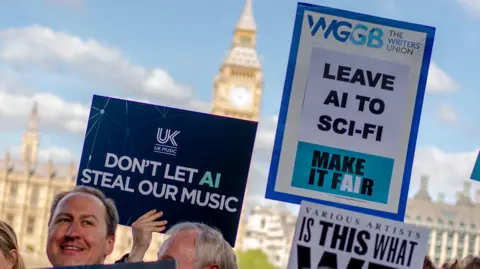 PA Media
PA MediaThe fierce battle over artificial intelligence (AI) and copyright – which pits the government against some of the biggest names in the creative industry – returns to the House of Lords on Monday with little sign of a solution in sight.
A huge row has kicked off between ministers and peers who back the artists, and shows no sign of abating.
It might be about AI but at its heart are very human issues: jobs and creativity.
It’s highly unusual that neither side has backed down by now or shown any sign of compromise; in fact if anything support for those opposing the government is growing rather than tailing off.
This is “unchartered territory”, one source in the peers’ camp told me.
The argument is over how best to balance the demands of two huge industries: the tech and creative sectors.
More specifically, it’s about the fairest way to allow AI developers access to creative content in order to make better AI tools – without undermining the livelihoods of the people who make that content in the first place.
What’s sparked it is the uninspiringly-titled Data (Use and Access) Bill.
This proposed legislation was broadly expected to finish its long journey through parliament this week and sail off into the law books.
Instead, it is currently stuck in limbo, ping-ponging between the House of Lords and the House of Commons.
The bill states that AI developers should have access to all content unless its individual owners choose to opt out.
Nearly 300 members of the House of Lords disagree.
They think AI firms should be forced to disclose which copyrighted material they use to train their tools, with a view to licensing it.
Sir Nick Clegg, former president of global affairs at Meta, is among those broadly supportive of the bill, arguing that asking permission from all copyright holders would “kill the AI industry in this country”.
Those against include Baroness Beeban Kidron, a crossbench peer and former film director, best known for making films such as Bridget Jones: The Edge of Reason.
She says ministers would be “knowingly throwing UK designers, artists, authors, musicians, media and nascent AI companies under the bus” if they don’t move to protect their output from what she describes as “state sanctioned theft” from a UK industry worth £124bn.
She’s asking for an amendment to the bill which includes Technology Secretary Peter Kyle giving a report to the House of Commons about the impact of the new law on the creative industries, three months after it comes into force, if it doesn’t change.
 Getty Images
Getty ImagesMr Kyle also appears to have changed his views about UK copyright law.
He once said copyright law was “very certain”, now he says it is “not fit for purpose”.
Perhaps to an extent both those things are true.
The Department for Science, Innovation and Technology say that they’re carrying out a wider consultation on these issues and will not consider changes to the Bill unless they’re completely satisfied that they work for creators.
If the “ping pong” between the two Houses continues, there’s a small chance the entire bill could be shelved; I’m told it’s unlikely but not impossible.
If it does, some other important elements would go along with it, simply because they are part of the same bill.
It also includes proposed rules on the rights of bereaved parents to access their children’s data if they die, changes to allow NHS trusts to share patient data more easily, and even a 3D underground map of the UK’s pipes and cables, aimed at improving the efficiency of roadworks (I told you it was a big bill).
There is no easy answer.
How did we get here?
Here’s how it all started.
Initially, before AI exploded into our lives, AI developers scraped enormous quantities of content from the internet, arguing that it was in the public domain already and therefore freely available.
We are talking about big, mainly US, tech firms here doing the scraping, and not paying for anything they hoovered up.
Then, they used that data to train the same AI tools now used by millions to write copy, create pictures and videos in seconds.
These tools can also mimic popular musicians, writers, artists.
For example, a recent viral trend saw people merrily sharing AI images generated in the style of the Japanese animation firm Studio Ghibli.
The founder of that studio meanwhile, had once described the use of AI in animation as “an insult to life itself”. Needless to say, he was not a fan.
There has been a massive backlash from many content creators and owners including household names like Sir Elton John, Sir Paul McCartney and Dua Lipa.
They have argued that taking their work in this way, without consent, credit or payment, amounted to theft. And that artists are now losing work because AI tools can churn out similar content freely and quickly instead.
Sir Elton John didn’t hold back in a recent interview with the BBC’s Laura Kuenssberg.
He argued that the government was on course to “rob young people of their legacy and their income”, and described the current administration as “absolute losers”.
Others though point out that material made by the likes of Sir Elton is available worldwide.
And if you make it too hard for AI companies to access it in the UK they’ll simply do it elsewhere instead, taking much needed investment and job opportunities with them.
Two opposing positions, no obvious compromise.

Credit: Source link











